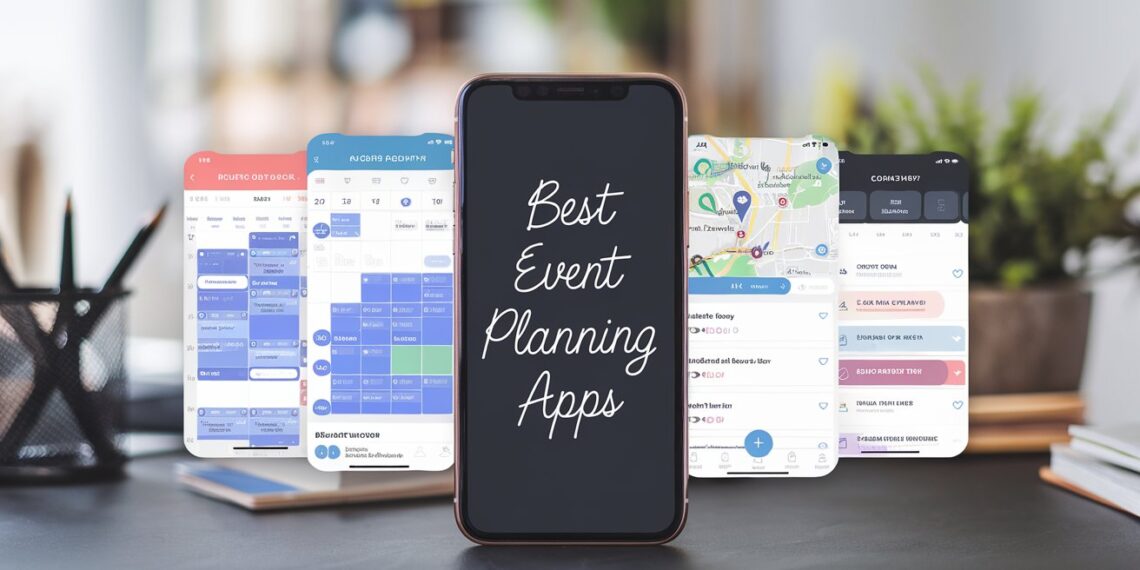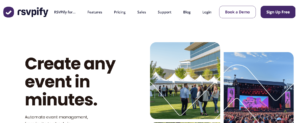In today’s fast-paced world, event planning has evolved far beyond the traditional pen-and-paper approach. With the rise of technology, event planners now have access to a wide range of digital tools designed to make the process smoother, faster, and more organized. Whether you’re hosting a corporate conference, planning a wedding, or organizing a social gathering, the right event planning app can take your event to the next level.
In this guide, we’ll explore the best event planning apps of 2025, break down their features, and help you choose the right tool for your needs. From budgeting and scheduling to guest management and virtual event hosting, we’ve got you covered.
What to Look for in an Event Planning App
When choosing the best event planning apps for your specific needs, there are several key factors to consider:
1. Key Features
Look for apps that include essential tools such as:
-
Budgeting: Help you manage your event’s financials.
-
Scheduling: Organize timelines, deadlines, and important dates.
-
Guest Management: Easily track RSVPs, create guest lists, and send invitations.
-
Task Assignments: Organize your team’s responsibilities.
-
Collaborations and Integrations: Ensure the app can integrate with other tools you may already use, such as Google Calendar, Zoom, or email platforms.
2. Ease of Use
Choose an app that is intuitive and easy to navigate. A complicated interface could add unnecessary stress to an already challenging process.
3. Cost
While some event planning apps are free, others offer premium features for a fee. Assess the value of the features offered and whether the cost justifies them for your event type.
4. Platform Compatibility
Make sure the app is available on the platforms you use, such as desktop, iOS or Android.
Now that you have an understanding of what to look for, let’s dive into the best event planning apps of 2025, categorized by different types of events.
Best Event Planning Apps for Corporate Events
Corporate event planning often requires a high level of organization, coordination, and communication. The following apps are ideal for managing large conferences, company retreats, trade shows, and other professional gatherings.
1. Bizzabo
Bizzabo is a leading all-in-one event management platform built for enterprise-level and large-scale events. It is especially favored by organizations that regularly host conferences, summits, and trade shows, both in-person and virtual. With robust tools for event registration, agenda management, audience engagement, and data analytics, Bizzabo enables event organizers to craft highly personalized and impactful experiences. One of its standout features is its unified event success platform, which brings together marketing, CRM integration, and real-time engagement metrics to optimize attendee satisfaction and ROI.
Another key advantage of Bizzabo is its emphasis on hybrid and virtual event capabilities. It supports live-streaming, real-time chat, networking lounges, breakout rooms, and even branded event apps. Its scalability makes it suitable for both small teams and enterprise clients, with features that cater to custom workflows and security requirements. Additionally, Bizzabo offers advanced reporting tools that give detailed insights into attendee behavior and event performance, helping organizers continuously refine their strategies. For companies looking for a premium, data-driven approach to event management, Bizzabo is a top-tier option.
Key Features:
-
Customizable event websites and apps
-
Attendee engagement tools, such as networking opportunities and live polls
-
Analytics to measure event success
-
Integration with CRM systems and social media
Pros:
-
Easy to use with a clean interface
-
Comprehensive reporting and analytics tools
-
Great for hybrid and virtual events
Cons:
-
Pricing can be on the higher side for smaller businesses
Ideal for: Large-scale corporate conferences, trade shows, and hybrid events.
2. Whova
Whova is widely recognized as one of the most versatile event planning apps, catering to both virtual and in-person events. What sets Whova apart is its user-friendly interface and extensive feature set that includes event registration, agenda management, exhibitor booths, and real-time attendee engagement. Organizers can customize agendas for individual participants, offer Q&A and live polling, and even create community boards to foster engagement well before the event begins. The app also supports badge printing, name tag generation, and check-in systems, which are essential for on-site efficiency.
Whova’s strength lies in its ability to improve attendee networking through its powerful in-app social features. Attendees can view who’s coming, schedule one-on-one meetings, and participate in group discussions directly within the app. Event organizers also benefit from the ability to gather feedback instantly through surveys and polls, making post-event analysis seamless. It supports a variety of event formats, including academic conferences, business expos, government forums, and non-profit fundraisers. Its mobile accessibility, automation tools, and hybrid-event readiness make it a reliable and flexible solution for event planners of all kinds.
Key Features:
-
Attendee management and registration
-
Personalized event agendas
-
Networking and community-building tools
-
Virtual event support
Pros:
-
Comprehensive features for both in-person and virtual events
-
Strong networking capabilities
-
User-friendly interface
Cons:
-
Can be overwhelming for smaller events with fewer attendees
Ideal for: Corporate events, conferences, and large networking events.
Best Event Planning Apps for Weddings
Weddings require a lot of attention to detail, and the right event planning app can make the process far less stressful. These apps are designed to help couples stay organized and ensure that every detail is taken care of.
3. HoneyBook
HoneyBook is a client management platform designed specifically for creative professionals, freelancers, and small business owners, including event planners and wedding coordinators. It excels at streamlining the business side of event planning with tools for managing client communication, sending proposals, tracking contracts, and processing payments all within one platform. With automation features for workflows, reminders, and client onboarding, HoneyBook removes much of the administrative burden from running an event-focused business.
The platform also offers powerful project management capabilities that help users keep track of every detail throughout the planning lifecycle. Users can create timelines, assign tasks, and centralize all communications, ensuring that nothing falls through the cracks. It integrates with popular tools like Google Calendar, Zoom, and QuickBooks, enabling planners to manage their events and finances cohesively. HoneyBook’s sleek, user-friendly design and all-in-one functionality make it particularly appealing for wedding planners and solo event organizers who want a more efficient way to manage both events and client relationships.
Key Features:
-
Client management and communication tools
-
Budget tracking and invoicing
-
Event scheduling and to-do lists
-
Integration with popular payment platforms
Pros:
-
All-in-one solution for planning and client communication
-
Ideal for vendors and planners
-
Streamlined payment processing
Cons:
-
May be too robust for those looking for a simpler, more straightforward app
Ideal for: Wedding planners, vendors, and couples organizing large weddings.
4. Zola
Zola is a wedding planning powerhouse that brings all aspects of wedding coordination into one beautifully designed app. It helps couples create personalized wedding websites, manage guest lists, organize seating charts, and build a comprehensive checklist to stay on top of their to-dos. Zola also includes a unique feature: an integrated wedding registry that can be accessed directly from a couple’s wedding site. This convenience makes Zola stand out as a consumer-focused tool that blends planning and gift-giving seamlessly.
Beyond basic planning tools, Zola acts as a one-stop shop for inspiration, vendor discovery, and budgeting. Couples can browse thousands of wedding products, book photographers or florists, and compare options within the app. The platform offers a modern, minimalistic design that appeals to tech-savvy users, while also being intuitive enough for users less familiar with digital tools. Zola is free to use and offers premium website domain upgrades for couples who want a custom URL. For modern weddings that require seamless coordination between planning, registry, and communication, Zola is an ideal choice.
Key Features:
-
Wedding website builder
-
Guest list manager and RSVPs
-
Wedding registry integration
-
Budgeting and checklist features
Pros:
-
All-in-one wedding planning and registry service
-
Beautiful wedding website templates
-
Free for couples
Cons:
-
Limited advanced features for large events
Ideal for: Couples planning weddings and smaller-scale events.
Best Event Planning Apps for Social Gatherings
Planning a birthday party, anniversary celebration, or any other personal event? The following apps are perfect for keeping things organized without the need for a professional event planner.
5. RSVPify
RSVPify specializes in guest list and RSVP management, making it the go-to app for event organizers who need a sleek and effective way to manage attendees. Whether it’s a private dinner party, corporate gala, or charity fundraiser, RSVPify allows users to customize RSVP forms, track plus-ones, restrict invite transfers, and send automated email updates. Its clean interface and strong privacy features give it a professional edge, especially for formal and upscale events.
In addition to managing invitations, RSVPify offers features such as seating charts, meal selection options, event ticketing, and guest check-in tools. The platform supports multiple event types under a single account, making it easy to manage recurring events or a series of gatherings. It also allows for data export and analytics, which helps planners assess turnout rates and guest preferences. With both free and premium pricing tiers, RSVPify is suitable for casual users as well as professionals who need a customizable and reliable RSVP solution without the clutter of unnecessary features.
Key Features:
-
Customizable RSVP forms
-
Guest list management
-
Invitation design
-
Event reminders and updates
Pros:
-
Extremely easy to use for personal events
-
Allows for customization of invites and forms
-
Free tier available
Cons:
-
Limited features for complex event planning
Ideal for: Birthday parties, reunions, and small personal events.
6. Evite
Evite is one of the most well-known digital invitation platforms, best suited for casual and social events like birthdays, holiday parties, and baby showers. Its main appeal is its simplicity: users can choose from hundreds of pre-designed invitation templates, customize details like time, location, and theme, and send them to their guests within minutes. Evite also includes RSVP tracking, event reminders, and the ability to add gift registries or donation links, making it highly functional for informal gatherings.
While Evite doesn’t offer the robust features of a full-fledged event planning suite, it does its core function, digital invitations, exceptionally well. The mobile app allows users to manage their events on the go, view responses in real-time, and communicate directly with guests. There are free and premium designs, with the paid tier offering more customization options and ad-free experiences. For individuals looking for a quick and easy way to send beautiful invitations and track attendance, Evite remains a trusted and reliable choice that balances simplicity with functionality.
Key Features:
-
Customizable invitations and themes
-
RSVP tracking and reminders
-
Event details management (time, location, etc.)
-
Integration with social media for easy sharing
Pros:
-
Free to use
-
Simple interface with attractive designs
-
Ideal for casual events
Cons:
-
Lacks advanced features for large or complex events
Ideal for: Informal events like birthdays, parties, and casual get-togethers.
Best Event Planning Apps for Virtual and Hybrid Events
With the rise of virtual and hybrid events, it’s essential to choose tools that support both in-person and online engagement. The following apps excel at creating seamless experiences for virtual and hybrid events.
7. Eventbrite
Eventbrite is one of the most recognized names in event registration and ticketing platforms, widely used for a diverse range of events including workshops, festivals, concerts, webinars, and networking events. It simplifies the process of creating, marketing, and managing events through its intuitive event page builder, which lets organizers customize pages with branding, images, and event details. The platform handles ticket sales, attendee tracking, and payment processing, allowing organizers to focus on content and logistics rather than administrative tasks.
What makes Eventbrite especially powerful is its integration with popular tools and platforms such as Zoom, Mailchimp, Salesforce, and Facebook. These integrations enable streamlined marketing and hosting for virtual and hybrid events, making it a preferred choice for digital-first organizers. Eventbrite also provides analytics dashboards that help track ticket sales, audience demographics, and promotional performance. Its mobile app allows on-site event check-ins and real-time attendee tracking, making it a full-service platform from pre-event promotion to post-event analysis. Whether you’re hosting a 50-person seminar or a 5,000-person concert, Eventbrite is scalable, secure, and built for reach and reliability.
Key Features:
-
Event ticketing and registration
-
Virtual event hosting tools (integrations with Zoom, Vimeo, etc.)
-
Customizable event pages
-
Analytics to track event performance
Pros:
-
Ideal for events of all sizes
-
Easy ticketing and registration process
-
Virtual event hosting integration
Cons:
-
Premium features require a fee
Ideal for: Conferences, concerts, and virtual events.
8. Hopin
Hopin is a next-generation platform specifically designed for virtual and hybrid events. Unlike traditional event tools that retrofitted for virtual needs, Hopin was built from the ground up for online experiences. It offers a fully immersive digital venue with features like main stages, breakout sessions, virtual expo booths, and one-on-one networking capabilities. This makes it ideal for conferences, trade shows, summits, and global community meetups that need to maintain audience engagement at scale.
Hopin stands out for its emphasis on real-time interaction and user engagement. Attendees can navigate seamlessly between different areas of the event, participate in live chat, polls, Q&As, and even video meetings with other participants. For event organizers, Hopin provides detailed analytics on attendee behavior, session popularity, and engagement levels, helping to refine future events. The platform also integrates with major CRM and marketing tools, making it easier to align event strategies with business goals. With a growing ecosystem and robust support for custom branding, Hopin has quickly become a go-to solution for organizations looking to deliver high-impact virtual and hybrid experiences.
Key Features:
-
Virtual event spaces (main stage, networking, sessions)
-
Interactive features like chat and Q&A
-
Integration with Zoom and YouTube
-
Event analytics and reporting
Pros:
-
Great for hybrid and large virtual events
-
High level of attendee engagement
-
Easy-to-use interface
Cons:
-
Can be costly for smaller events
Ideal for: Large-scale virtual conferences, trade shows, and hybrid events.
Conclusion
The best event planning apps of 2025 offer a wide range of features that cater to different types of events. Whether you’re planning a corporate conference, a wedding, a social gathering, or a hybrid event, there’s an app designed to streamline your event management process. Consider factors such as the type of event, your budget, and the specific features you need when selecting the right app for your event.

















